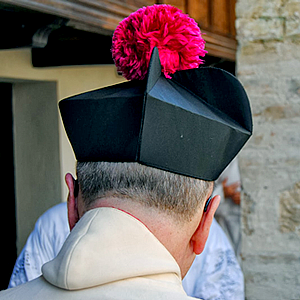
 ATICAN INSIDER REPORTS that Pope Francis has put an end to the naming of Monsignori, unless a priest be over the age of 65. Will this move have any effect on the scandalous and damaging secular music performed each Sunday in so many Catholic churches? Will it help solve the massive crisis of faith afflicting our Church since the Council? Will it cause even one lapsed Catholic to resume attending Mass on Sundays? I suppose only time will tell, but these are some of the most pressing priorities on Francis’ plate.
ATICAN INSIDER REPORTS that Pope Francis has put an end to the naming of Monsignori, unless a priest be over the age of 65. Will this move have any effect on the scandalous and damaging secular music performed each Sunday in so many Catholic churches? Will it help solve the massive crisis of faith afflicting our Church since the Council? Will it cause even one lapsed Catholic to resume attending Mass on Sundays? I suppose only time will tell, but these are some of the most pressing priorities on Francis’ plate.
One writer said it’s an effort to curb careerism, but he obviously has no clue. The best way to stop careerism would be mandating a minimum period of time a priest must serve in a “typical” parish setting before being assigned to teach in the seminary or do Chancery work. Such inaccurate analysis, however, is not surprising, since gibberish from unqualified sensationalists abounds when it comes to Pope Francis. The naming of Monsignori had been a way individual bishops could recognize faithful service, and each bishop was free to name them or not. The hypocrisy of some applauding this action is unbelievable, since these same quarters are usually in favor of “individual bishops governing their own dioceses without interference from Rome.”

YOU’RE PROBABLY THINKING, “OK, Jeff, since you’re so smart, what reforms should Francis enact?” I would like to see Francis start to curb the “horse barn” mentality of the Church. What? You never heard of that mentality? I will explain:
One of the favorite techniques of the “liturgical progressives” since the Council is to allow a forbidden practice for a period of time. Then, when Rome finally demands an account, the perpetrator says, “Oh, but this already being done. The horse is already out of the barn. We can’t turn back the clock now …” In other words, halting a (forbidden) practice already being done has somehow been considered unthinkable. A reliable witness has told me that Archbishop Weakland often used this technique in his now notorious dealings with Rome.
I’m reminded of an “open letter” written last year by Roger Cardinal Mahony. In it, he responded to Archbishop José Gomez, who had been forced to strip him of all public duties owing to Mahony’s malfeasance in concealing clergy sex abuse (for which his diocese paid nearly a billion dollars in damages). I’m not going to quote the entire letter, which is extremely petulant and self-serving, but here’s an excerpt:
I have stated time and time again that I made mistakes, especially in the mid-1980s. I apologized for those mistakes, and committed myself to make certain that the Archdiocese was safe for everyone. Unfortunately, I cannot return now to the 1980s and reverse actions and decisions made then.
Once again, we see the “horse barn” mentality … but, what is the proper response? Well, for starters, Mahony should not have attended the Conclave, because his judgment is obviously not sound. Also, he should have spent the rest of his life in a monastery doing penance, as well as giving his personal funds to the victims and meeting with them each year. I could keep going, but in essence, merely saying, “Oops!” is insufficient. If I break your window and sincerely apologize, you ought to say, “I accept your apology … but you still must repair the window you broke!”
In my humble opinion, I think eliminating Monsignori under 65 is akin to “rearranging deck chairs on the Titanic.” However, I believe all Monsignori are obligated pay some kind of special “tax” each year, on account of their office. Perhaps all that money can now be pledged to support our efforts here at CCW! Hey, I can dream, can’t I?
